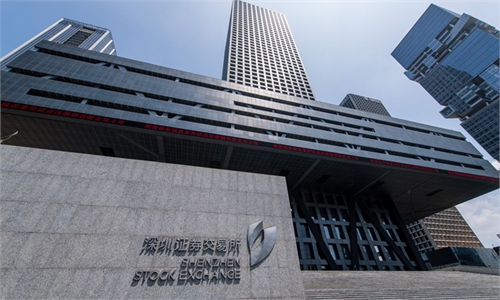
stock market Photo:VCG
International financial institutions are increasingly upbeat on Chinese stocks, with the NASDAQ Golden Dragon China Index surging by 14.86 percent in the 10 trading days ended on Friday, the highest growth rate for a two-week period since January 2023.
According to international financial giants including Morgan Stanley and Bridgewater Associates, the China market is a good place to diversify their investment portfolios and explore value, as international investors' interest in yuan-denominated assets is on the rise.
On Thursday, the index jumped by 6.01 percent, the highest daily increase since the end of July last year, data showed. Analysts said that an opportunity is emerging for medium- and long-term capital to flow into yuan assets, especially China's stock market.
Given the rollout of targeted policies to boost the high-quality development of the A-share market and the sustained recovery of China's economy, now is a good opportunity to invest in China's stock market and Chinese companies, Yang Delong, chief economist at Shenzhen-based First Seafront Fund, told the Global Times on Sunday.
He said the valuations of the A-share and Hong Kong stock markets are near record lows, and confidence and patience are needed to achieve long-term gains.
The Communist Party of China (CPC) Central Committee Political Bureau meeting, held on April 30, vowed to front-load efforts to effectively put the established macro policies in place, and well implement a proactive fiscal policy and a prudent monetary policy.
Those policies will further promote an economic recovery and boost the development of China's stock markets, Yang said.
Since the beginning of 2024, global asset management companies have expanded their investment portfolios in China, boosted by their growing confidence in Chinese assets.
"Global funds are returning to China stocks," Bloomberg reported in March, citing Morgan Stanley analysts.
Bridgewater Associates founder Ray Dalio posted on social media platform LinkedIn on April 1 saying that "[T]here is no such thing as a bad market; there is only bad decision making. I find the markets in China good for my type of decision making."
Recently, stocks in the Chinese mainland and the Hong Kong Special Administrative Region (HKSAR) staged a stunning rebound after the State Council, the country's cabinet, pledged measures to keep the stock market stable.
The benchmark Shanghai Composite Index regained the 3,100 level at the end of April after diving to a multi-year low.
In the first quarter of this year, net inflows of northbound capital - overseas money flowing into China's A-share market through the HKSAR - reached 68.22 billion yuan ($9.65 billion), exceeding the total in 2023, the China Securities Journal reported, citing data from information provider Choice.
In April, the State Council released guidelines on strengthening regulation, forestalling risks and promoting high-quality development of the capital market. This was the third guideline document on the capital market from the State Council in two decades.
By strengthening supervision, and effectively preventing and defusing risks, the new guideline has made arrangements in areas including listings, transactions and the entry of long-term capital. This is expected to enhance fairness and efficiency in the A-share market and stimulate market vitality, Dong Shaopeng, a senior research fellow at the Chongyang Institute for Financial Studies at Renmin University of China, told the Global Times.
The challenges faced by the A-share market are temporary and a bull market will eventually come, Dong said, noting that targeted policies and sound macroeconomic operations will inject new impetus into the capital market.
He said that more efforts are needed to strengthen regulations involving the major shareholders of listed companies, agencies, local governments and stock exchanges. In addition, diversified delisting channels are needed to protect the rights and interests of common investors during the whole process of delisting.



